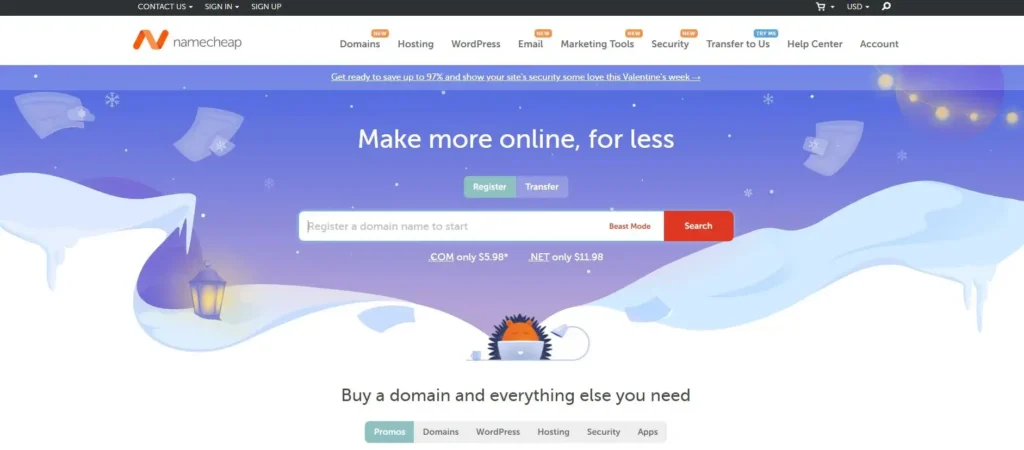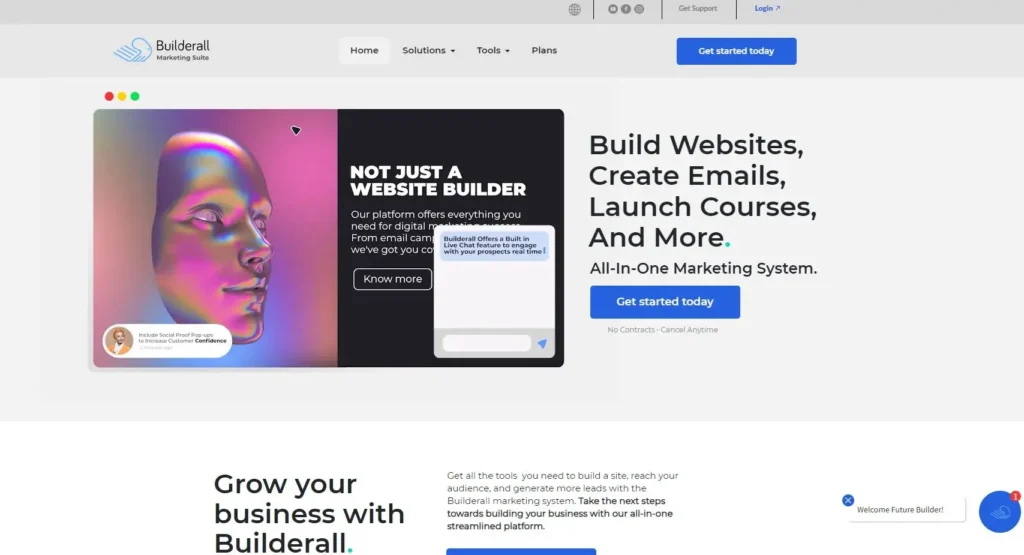Table of Contents
Introduction
The most important thing for anyone about starting a blog is choosing a good web hosting service, in today’s article, we will recommend and explain an enormous company in the web hosting industry, Namecheap is one of the most famous and well-known website that provides the web hosting services and many more services, we will explain everything in this article and also our review and experiment with them.
What is Namecheap?
Namecheap is a domain registrar and web hosting company. It provides domain name registration, web hosting, SSL certificates, and other related services for individuals and businesses looking to establish an online presence.
Namecheap is known for its affordable pricing, user-friendly interface, and reliable customer support.
Few brands live up to their name quite as well as Namecheap. You can usually get a domain name at a great price. The company started as a domain registrar in 2000, and its success led Namecheap to add on other services.
Today, the company hosts over 17 million domain names worldwide. They are definitely doing something right.
While some companies make their money off upsells, Namecheap prides itself that it does not use the upsell tactic to make money. Instead, they work to provide affordable pricing plans that give you what you need
Namecheap: The Good and The Bad
Let’s take the plunge into Namecheap’s pros and cons so that you can determine whether its pros give you what you need and if the cons aren’t deal-breakers.
The Good
Trusted Brand: Namecheap has been around for over 20 years and is no stranger to the world of hosting. With over three million hosting customers under its wing, Namecheap is doing something right. You can trust that over the years, they have worked out a lot of kinks and today have a generally good product.
Good Uptime: An uptime you can rely on is an absolute necessity. The more time your site spends offline, the more customers you’ll lose—which is why we love Namecheap’s 100% service level agreement for uptime. If an uptime of 100% isn’t achieved, you get your money back. Now that’s customer service.
Namecheap can offer this because they have a history of strong uptime. There have been some minor dips in the past, but nothing catastrophic and nothing that didn’t get it oh-so-close to the 100% mark. Currently, the average uptime sits at 99.97%, which is pretty darn close to perfect.
Free Domain and Migration: If you have your website hosted with another provider but aren’t happy with the services, Namecheap makes it cheap and easy to switch over to their plans. They are so cheap, in fact, that they charge you nothing. Yes, that’s right; Namecheap offers free migration of your site from other hosting providers. If they don’t complete the migration within 24 hours, your first year of web hosting is free.
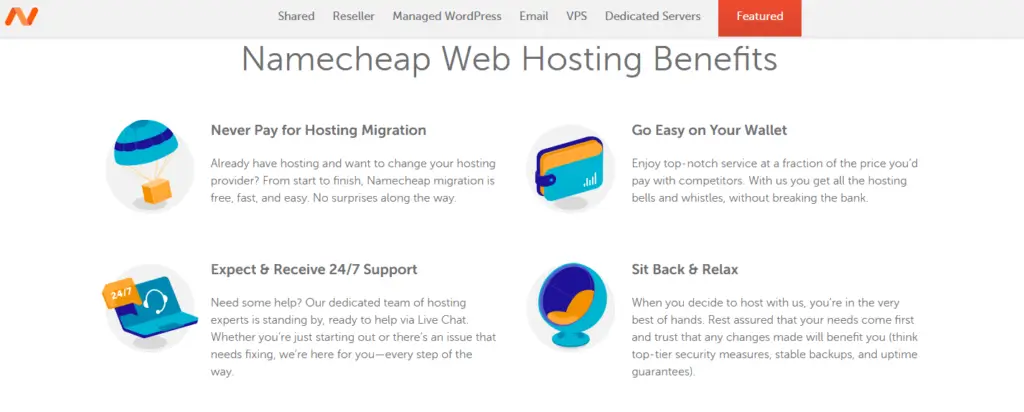
What they also provide for free is a domain with the purchase of a plan. This makes sense since domains are their specialty. But we love a good freebie, especially when it’s something we will actually use.
Money-Back Guarantee: Not happy with your Namecheap experience? No problem. If you decide within 30 days of starting your services that you don’t like what is going on, they will refund you.
That means you have an entire month to take your Namecheap plan for a test run. If you’re not happy at the end of that run, you can switch to another plan option or get your money back.
Great Basic Plan: Unlike other web hosting providers on the market, Namecheap’s entry-level plan offers more than the bare minimum. This means you’ll be able to keep the cost-friendly package for longer without having to upgrade within months.
Don’t let the name fool you because, even though their basic plan is cheap (we are talking pocket-change-just-over-a-dollar cheap), they offer a lot more than most of their competitors. Namecheap’s bare minimum plan comes with unmetered bandwidth, twice weekly backups, and a free SSL certificate for the first year.
Quick Load Time: No one wants to hear the Jeopardy theme song while they sit and wait for a website to load. If a website takes more than 3-4 seconds to load, there is almost a 100% guarantee that those people will abort the mission and head to another website.
According to Google, a website should load in less than three seconds in this day and age. However, you should aim for less. Namecheap makes Google’s number attainable. Their average page speed is 458 ms, which passes the test with flying colors. The fastest times clock in at 192 ms when you upgrade to Namecheap’s EasyWP WordPress hosting plans.
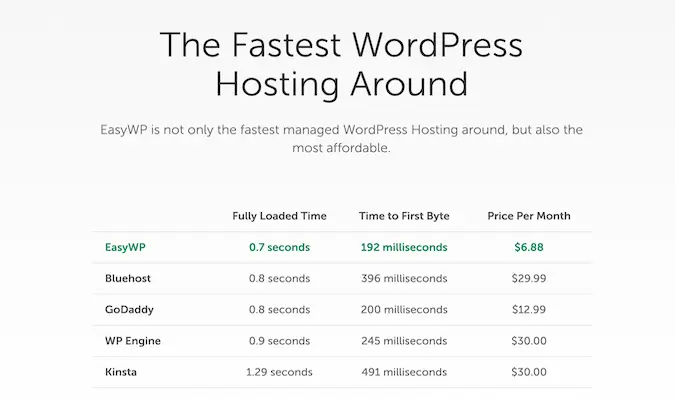
Great Value: True to its name, Namecheap is really affordable. But it’s not cheap in the sense of poor quality or “you get what you pay for.” Namecheap offers cost-effective hosting solutions that are an amazing value when you compare them against alternatives on the market. This holds true across all of its hosting types and plan tiers.
For example, the entry-level Stellar plan costs less than a cup of coffee at $1.58 per month. It can host up to three websites and comes with a free domain for one year. Other web hosts on the market charge double the price for an entry-level plan and only support a single website. Some don’t offer a free domain name your first year unless you’re signed up for the next plan tier.
Versatile Hosting Options: With any web host, it’s important to assess all of the hosting types and plans available. Even if you know that you want a cheap shared plan, your hosting needs will likely change over time. So rather than having to deal with the headaches associated with finding a new host and migrating your data, it’s much easier to grow within the hosting provider you selected from the start—and Namecheap makes that possible.
Let’s say you start with a shared package. You can always jump to a higher plan tier within the shared level or upgrade to VPS. From there, you may want to consider a managed WordPress plan hosted on Namecheap’s cloud servers. These can accommodate anywhere from 50,000 to 50,000 monthly visits, so you’ll never outgrow Namecheap.
Simple Account Management: You don’t need to be a developer or have any technical experience to use Namecheap. It’s beginner-friendly with its simple and intuitive interface. You’ll be able to manage your plan and everything else on the back end without having to go through extensive training or anything like that.
The Bad
Unreliable Customer Support: Namecheap’s knowledge base is an excellent resource if you’re having problems that you think might be common and experienced by others in your shoes. Topics include everything from SSL certificates to email service. They also offer how-to videos that walk you through all sorts of questions and provide solid answers. But if you can’t find what you’re looking for in these self-help resources, things may get a bit tricky.
Namecheap has live chat support that is quick to respond at first, but the support does not stay strong when the questions start coming out. The amount of time it takes to get questions answered in the chat is more than we are comfortable with. You also have the option to submit a ticket for any questions or concerns, but that won’t warrant a quick response. And phone support doesn’t exist, so don’t even try to search for a number to call.
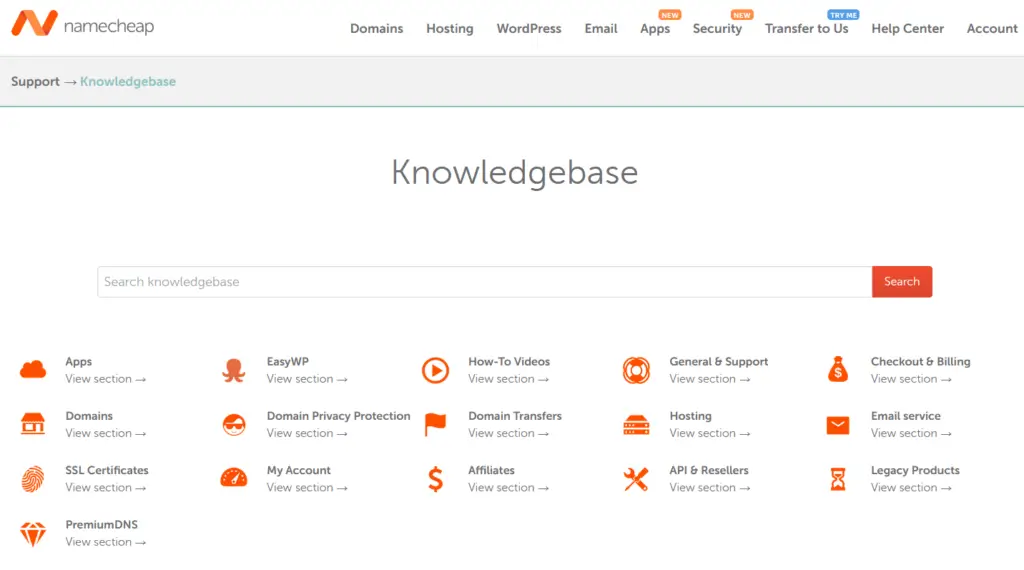
SSL Certificate is Only Free For One Year: Having an SSL certificate is an absolute must for every website in today’s day and age. An SSL certificate will authenticate your site and add a layer of protection to protect you and your visitors.
While it’s nice that Namecheap offers a free SSL for one year, it’s not so nice that you’ll have to pay for the SSL after that. Other web hosts on the market offer free SSL certificates for the lifetime of your subscription. So this is definitely an area where Namecheap falls short. If you sign up for them and you’re looking for alternative options after the one-year mark.
Price Jumps After Promo Expires: This is fairly common in the web hosting industry. But it’s still worth mentioning as you’re considering Namecheap. You can expect your web hosting cost to nearly triple after the new customer promotional period expires.
While the plans are still cheap, tripling the cost is still a significant price increase. Other web hosts on the market let you sign up for a three or four-year plan to lock in those savings for as long as possible. But they only offer a two-year contract at the longest.
Namecheap Pricing and Options
Now it’s time to explore all the different package options with Namecheap. And there are plenty to choose from. Whether you are just starting on a website and are looking for something basic for personal use, or you are a company looking to build a high-traffic website you can rely on, Namecheap has something for you.
Namecheap Shared Hosting
Namecheap’s shared hosting plans are an excellent option for brand-new websites. With plans starting at just $1.58 per month, it’s one of the cheapest ways to get started from a reputable hosting provider.
Even though this is an entry-level hosting solution, you’re still getting unmetered bandwidth and a 100% uptime guarantee.
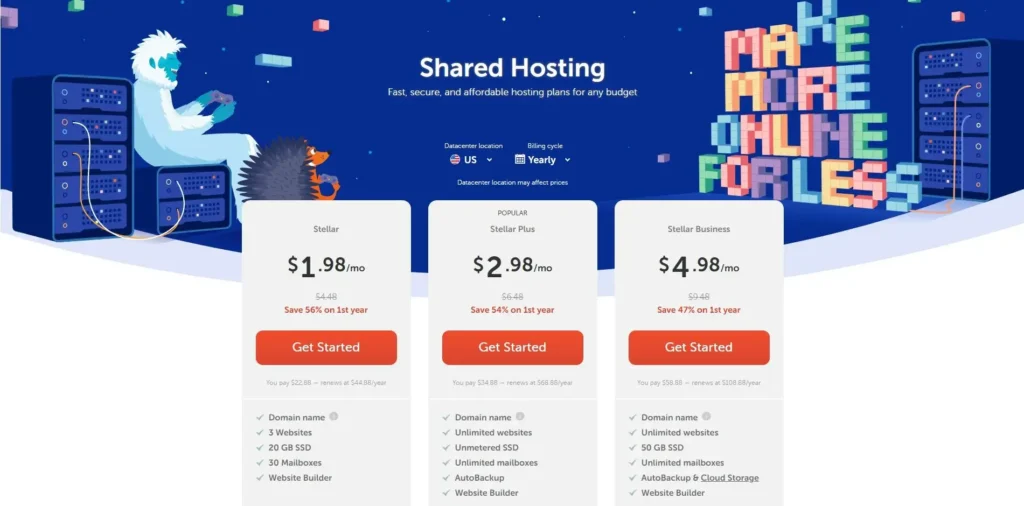
Here’s a closer look at the breakdown of each plan:
Stellar. This is the lowest level of the plan with Namecheap, but you get a lot. Included are a 20 GB SSD, three websites, a free domain name (for the first year), and a free CDN. This package starts at $1.98 per month with a two-year contract, and $1.98 per month with an annual contract. Month-to-month plans start at $4.48.
Stellar Plus. This package comes with unlimited SSD, unlimited websites, auto-backup, free domain name, free CDN, and more. You’ll pay $2.98 per month when you pre-pay for two years or $2.98 per month billed annually. The monthly, no-contract plan Stellar Plus plan starts at $6.48.
Stellar Business. For those looking to start a small website for their business, this may be right for you. You get 50 GB SSD, unlimited websites, auto-backup, cloud storage, free domain name, free CDN, and more. Pricing for this starts at $4.98 per month with a two-year subscription. The annual rate starts at $4.98 per month, and monthly billing starts at $9.48.
On top of the above, all shared hosting plans get a free website builder, domain name, privacy protection, free SSL certificate, free SSL installation, cPanel, email service, and 24/7 support.
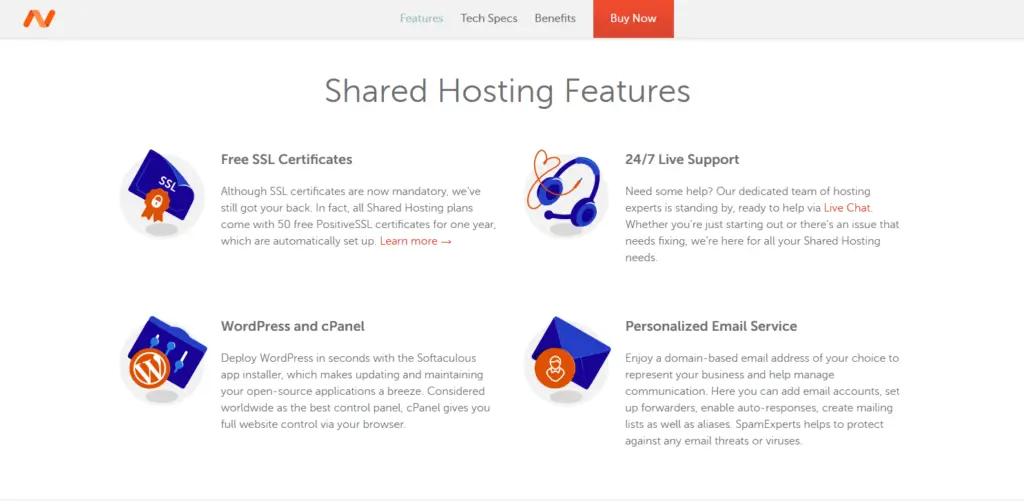
For new websites and small websites that aren’t anticipating a ton of traffic right away, the shared plans from Namecheap should be more than enough to accommodate your needs.
Namecheap Reseller Hosting
Reseller Hosting is a great way to earn some passive income. You can purchase a reseller plan from Namecheap and then sell plans to people you know, such as friends or customers.
Since Namecheap’s reseller packages are so affordable, it’s fairly easy to turn a profit with just a few clients.
Namecheap makes it simple for anyone to earn some extra cash as a reseller, which is perfect for someone looking for recurring revenue through a low-maintenance side hustle.
But it’s also a great option for existing agencies. If you’re offering web design, development, marketing consulting, or similar services, you could simply add web hosting to your offerings. Then you can upsell your clients and even charge more for ongoing site management.
There are three different reseller plans to choose from, and the prices below are based on yearly billing:
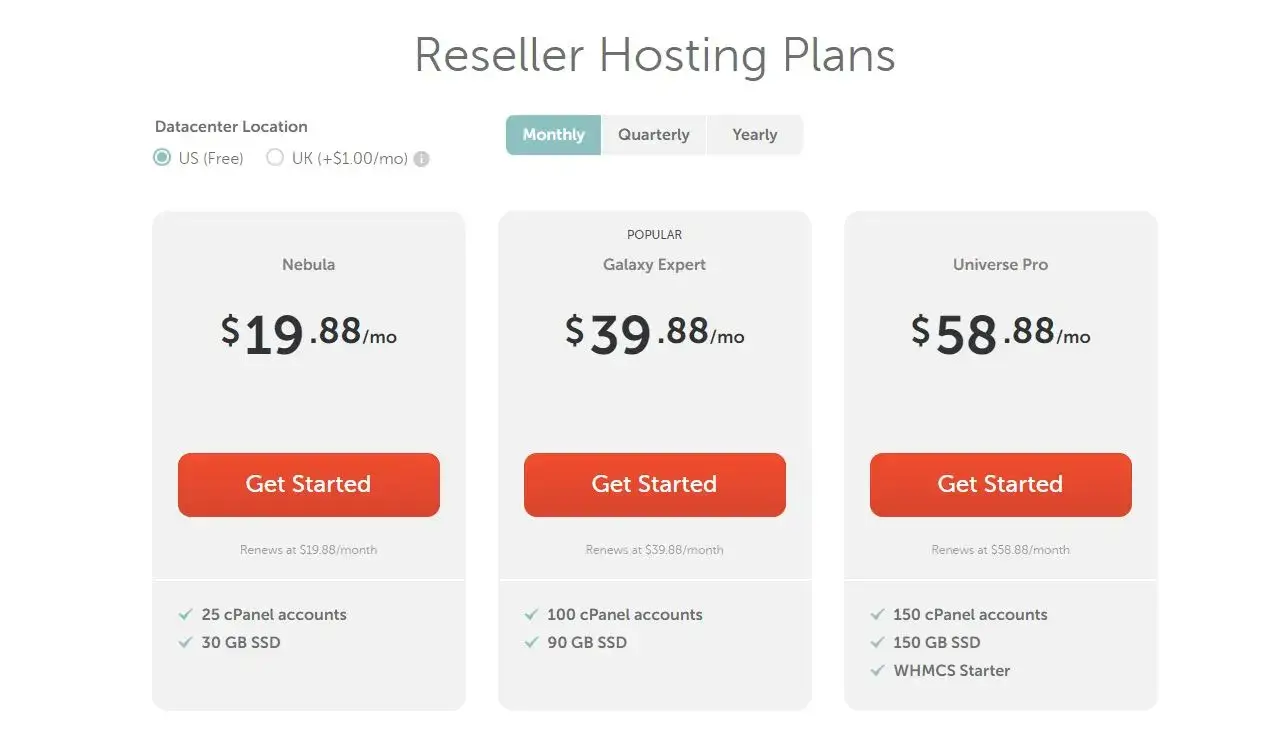
Nebula. This is the cheapest reseller hosting plan and comes with 30 GB SSD and 25 cPanel accounts that you can sell to others. This plan will cost you $19.88 per month, billed annually.
Galaxy Expert. The next level of reseller hosting will give you 90 GB SSD and 100 cPanel accounts to sell. This is priced at $39.88 per month, billed annually.
Universe Pro. If you’re looking to do some serious reselling, this plan may be the right one for you. It comes with 150 GB SSD and 150 cPanel accounts. It will cost you $58.88 per month, billed annually.
Each of the reseller plans also includes the following:
- Ability to manage from cPanel
- Unmetered bandwidth
- Unlimited domains/subdomains
- WMH control
- Account management tools
- High-powered reseller servers
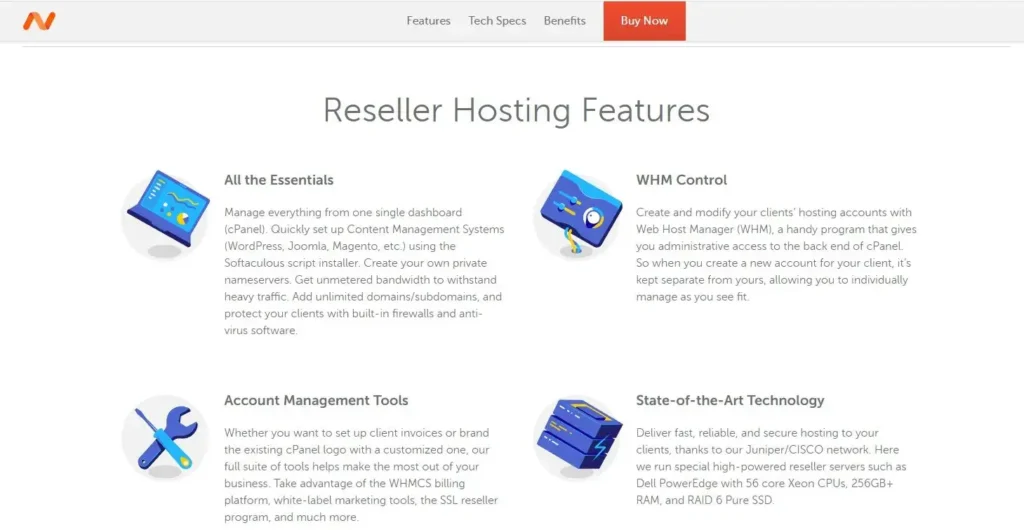
Namecheap WordPress Hosting
Namecheap offers managed WordPress Hosting. This means that everything is pre-optimized for WordPress, and Namecheap handles all of the technical aspects for you on the backend.
Unlike other web hosts on the market, Namecheap’s WordPress plans are hosted on Namecheap Cloud. This is a step above traditional shared hosting, which leads to better performance and the ability to accommodate more site traffic.
If you’re planning to use WordPress, these hosting plans are for you.
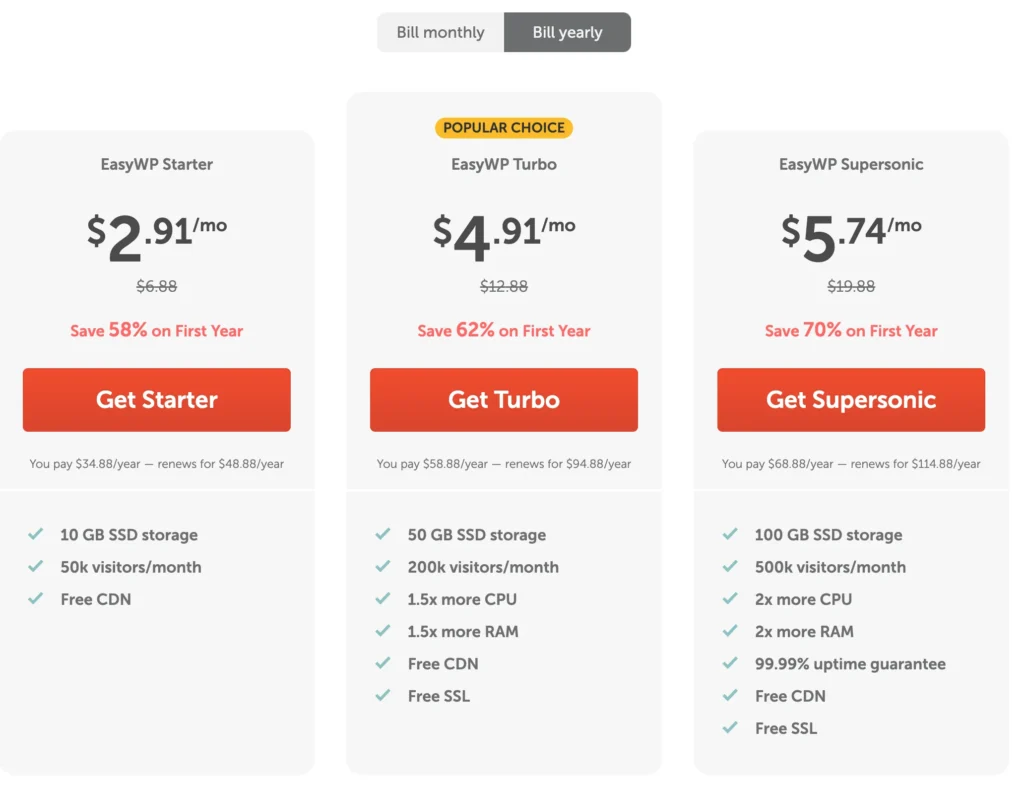
EasyWP Starter. This is great for your first WordPress website. This plan gives you 10 GB SSD and 50,000 visitors per month for $2.91 per month, billed annually.
EasyWP Turbo. Want to grow your WordPress site? Try this plan that gives you 50 GB SSD, 1.5 times more CPU, 1.5 times more RAM, free SSL, free CDN, and 200,000 monthly visitors for $4.91 per month, billed annually.
EasyWP Supersonic. If you want to scale your website to its maximum, this plan may be right for you. You get 100 GB SSD, two times more CPU, twice the RAM, a 99.99% uptime guarantee, free SSL, free CDN, and 500,000 monthly visitors for $5.74 per month, billed annually.
VPS Hosting
For more control and flexibility with your website, VPS hosting plans are a great option. VPS hosting gives you full root access and the ability to choose your operating system.
This is a step above shared hosting, and it’s a logical next step for anyone who has outgrown their shared resources. You could also consider jumping straight into a VPS plan from Namecheap if you’re expecting lots of traffic from the beginning.
E-commerce websites often opt for VPS hosting out of the gate so their customers experience faster page loading times—meaning they’re less likely to abandon carts due to performance issues.
True to the theme of every other hosting option offered by Namecheap, the VPS packages are very affordable.
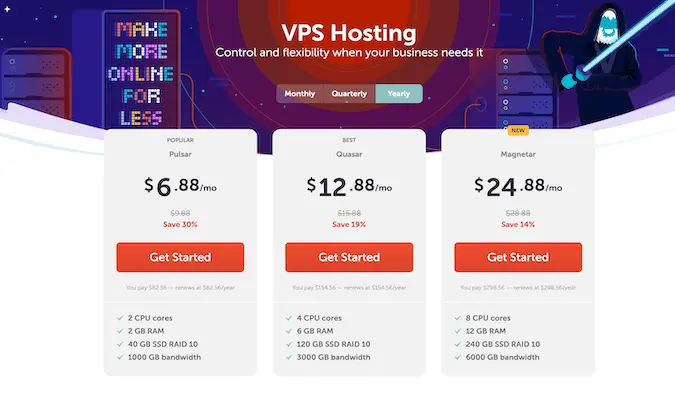
Pulsar. This popular VPS hosting plan gets you two CPU cores, 2 GB RAM, 40 GGB SSD RAID 10, and 1000 GB bandwidth. It is priced at $6.88 per month, billed annually.
Quasar. This plan is a great value and gets you four CPU cores, 6 GB RAM, 120 GB SSD RAID 10, and 3000 GB bandwidth. It is priced at $12.88 per month, billed annually.
Magnetar. This is Namecheap’s top-of-the-line VPS plan. It comes with 8 CPU cores, 12 GB RAM, 240 SSD RAID 10, and 6000 GB bandwidth for $24.88 per month, billed annually.
If you’re currently using another web hosting provider and you’re considering the switch to a Namecheap VPS plan, Namecheap will transfer your site for free.
Dedicated Hosting
If you need your own servers to have free reign over what you do, then a dedicated hosting plan is something you should look into.
In the world of web hosting, dedicated servers are considered top-of-the-line and typically come with a premium price tag. But true to its name, Namecheap offers tons of different dedicated servers with some starting as low as $48.88 per month.
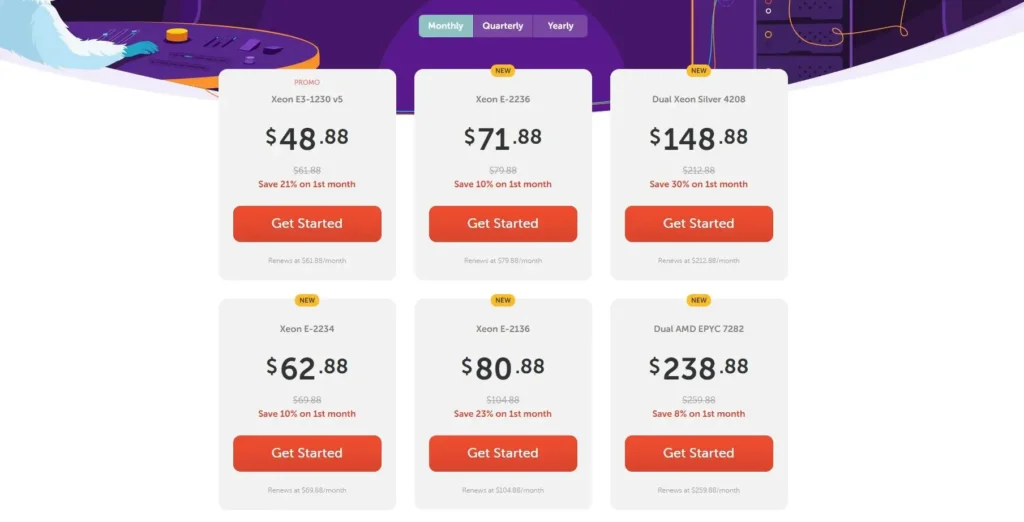
In total, Namecheap has more than 65 different dedicated servers to choose from. You can narrow your search by price, CPUs, RAM, disk drive, or browse servers across the following four categories:
- Entry-level servers: Good for high-traffic sites, small apps, and resellers.
- Medium-level servers: For larger resellers, SaaS companies, databases, and apps.
- Advanced-level servers: Best for larger SaaS products, multi-user applications, and large databases.
- Outlet servers: Discounted and clearance rates on legacy servers.
Namecheap is the best place to get a dedicated server if you’re on a tight budget and looking for a deal.
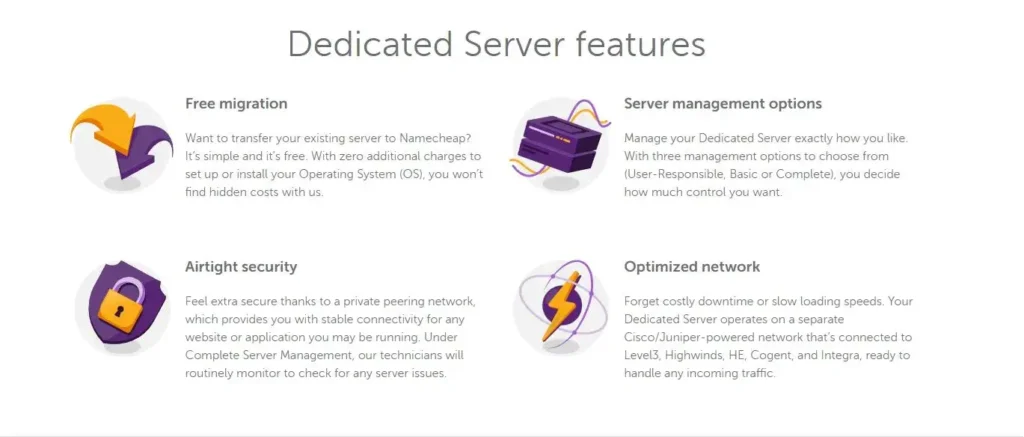
Conclusion
Namecheap is very good web hosting for small websites and blogs that do not drive so much traffic, they have a variety of good and cheap plans for this category, When you are considering Namecheap for your web hosting and learning the pros and cons of this provider, it is also important to note that there are other options.
If you need more web hosting websites, check out the Hostinger article.

